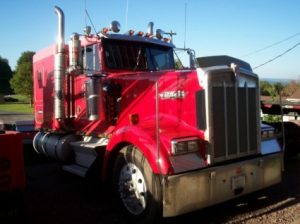When it comes to auto insurance coverage following a motor vehicle accident, it’s important to understand that crashes involving semi-trucks are totally different from those involving passenger-style vehicles such as cars, pickup trucks or motorcycles. That’s because if you are struck by a pickup truck, it’s more likely that than not that there will be more than one commercial policy for the defendant and the trucking company. 
Trucking carriers are required to carry insurance by the Federal Motor Carrier Safety Administration (FMCSA) and they don’t follow the same rules as those required for passenger vehicles. In general, policies that cover semi trucks are much larger than those that cover passenger vehicles, primarily because it’s well-established that these vehicles tend to cause far more damage when involved in an accident. Typically, you don’t want to settle a truck accident claim too quickly because it’s important to have a good idea to have a better handle on the type and scope of injuries, the necessary treatments involved and the impact it will have on one’s work and home life.
Because it’s not uncommon in these cases for victims to be dealing with more than one commercial insurance company, it’s imperative to seek the assistance of an experienced truck accident lawyer.
Let’s look, for example, at the recent truck accident wrongful death case of Great West Cas. Co. v. Robbins, recently weighed by the U.S. Court of Appeals for the Seventh Circuit. The matter before the court did not have to do with liability for the crash. Rather, the action was to ascertain whether a commercial insurer had an obligation to indemnify defendant truck driver and his employer. The insurer argued it shouldn’t have to, but the defendants and a second commercial insurer argued it should.
For plaintiff, of course, indemnification by this insurer would mean the potential for additional damages, which were extensive given that this was a wrongful death lawsuit.
According to court records, the crash happened in January 2011 when a tractor-trailer driven by defendant Philips struck a vehicle operated by decedent Robbins on a highway in Indiana. Robbins died from his injuries. At the time, Philips was an employee of Hoker Trucking, LLC and was driving the tractor-trailer in the course and scope of her employment. That company is based in Iowa and owned the tractor driven by Philips. However, the trailer that was being hauled was on loan from a company called Lakeville Motor Express Inc., based in Minnesota. However, Lakeville wasn’t even the actual owner of that trailer. The owner was a company called Wren Equipment, LLC, also based in Minnesota. Wren had leased the trailer involved in the crash on a five-year basis to Lakeville for $22,600 per month and provided insurance on those trailers. After the five years were up in 2006, the lease converted to a month-to-month, though at the time of the crash, Lakeville had signed on a 1-year lease extension. At that point, Lakeville agreed to provide at least $1 million in insurance coverage. The trailer continued to be leased until 2013.
To satisfy the lease agreement, Lake purchased a $5 million commercial insurance policy from Great West Casualty Co., and Wren was added on as an additional insured policy. Neither Philips nor Hoker were named as insured parties on that policy. Meanwhile, Hoker was insured by Northland Insurance Company, which provided $1 million primary coverage at the time of the crash.
Plaintiff, decedent’s widow, filed a lawsuit in state court against the trucking company, its driver and the company that leased the trailer, alleging negligence. The company that leased the trailer was later dismissed form the action.
Subsequently, Great West filed a request seeking declaratory judgment stating it was not liable to defend or indemnify the trucking company or its driver for the crash. Trial court ruled the Great West policy unambiguously excluded Hoker and Phillips as insured parties under the policy, which meant plaintiff would not be entitled to collect on that $5 million policy. The 7th Circuit affirmed, finding that because the trailer was being driven in furtherance of Hoker’s business – not Lakeville’s – the policy unambiguously excluded coverage.
Call Fort Lauderdale Injury Attorney Richard Ansara at (954) 761-4011. Serving Broward, Miami-Dade and Palm Beach counties.
Additional Resources:
Great West Cas. Co. v. Robbins, Aug. 16, 2016, U.S. Court of Appeals for the Seventh Circuit
More Blog Entries:
Road Debris Causes Thousands of Florida Car Accidents Annually, Aug. 15, 2016, Fort Lauderdale Truck Accident Attorney Blog
 Broward Injury Lawyer Blog
Broward Injury Lawyer Blog



